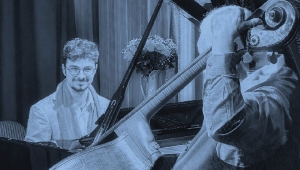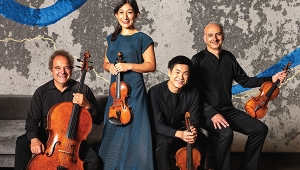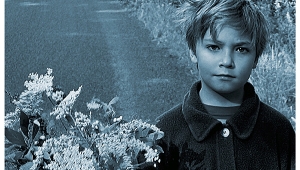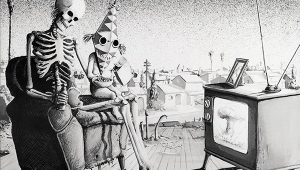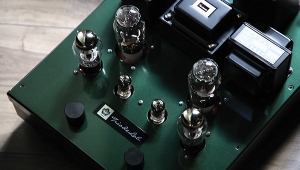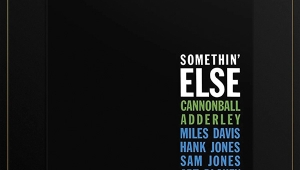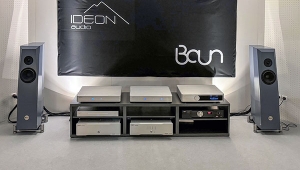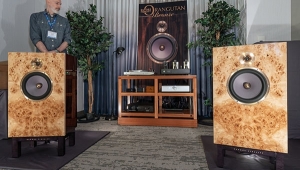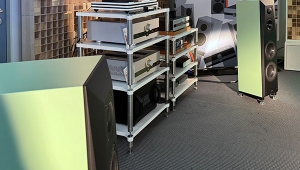| Columns Retired Columns & Blogs |
June 2024 Jazz Record Reviews
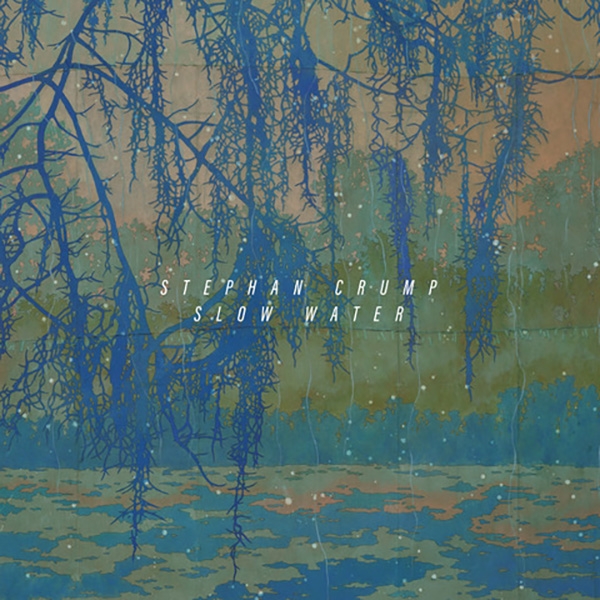
Stephan Crump: Slow Water
Crump, bass; five others
Papillon Sounds PS 28242 (CD, available as LP). 2024. Crump, prod.; Chris Benham, Cat Evers, engs.
Performance ****½
Sonics ****½
Crump, bass; five others
Papillon Sounds PS 28242 (CD, available as LP). 2024. Crump, prod.; Chris Benham, Cat Evers, engs.
Performance ****½
Sonics ****½
The first impression of this record is the freshness and richness of its sonic palette. There may never have been a jazz album with this exact instrumentation: vibraphone (Patricia Brennan); trumpet (Kenny Warren); trombone (Jacob Garchik); viola (Joanna Mattrey); violin (yuniya edi kwon). Stephan Crump's acoustic bass leads this band from within. His compositions and arrangements configure six distinct instrumental voices into fascinating blends.
Crump is best known as Vijay Iyer's bassist, but he has led and co-led strong groups of his own. This new project, Slow Water, is very much a concept album. It was inspired by Erica Gies's book Water Always Wins, which investigates how the earth's bodies of water have been abused by man, yet have endured man's attempts to impose dominion. The concept unites the album's 16 tracks into an unbroken suite. The music contains poignance (from the damage we've done) but also recognition that however much we abuse it, water retains the power to kick our collective ass.
Half the tracks are intricately detailed, through-composed pieces by Crump. Alternating with them are eight shorter "conceptual prompts," which generate improvisations by the sextet in which new, spontaneous motifs are added to the story.
Stringed instruments are appearing with increasing frequency in today's jazz ensembles. Crump writes meticulously and beautifully for strings. Melodies sound more yearning when played on a violin.
Crump assembles his composed pieces slowly, gradually introducing themes and voices. "Bogged" is representative. It takes almost nine minutes to accumulate its revelatory elements: plucked strings, a vibraphone floating and lingering, horns in solemn unison, like tributaries to a river's main stream. At the confluence, the full ensemble flows as one.—Thomas Conrad

John Surman: Words Unspoken
John Surman, Rob Luft, Rob Waring, Thomas Strønen
ECM 2789 (CD). 2024. Manfred Eicher, prod.; Martin Abrahamsen, eng.
Performance ****
Sonics ****½
English reed player John Surman has often recorded with guitar; vibraphone, not so much. Only twice has he performed with both in a small instrumental band: 1970's Where Fortune Smiles with John McLaughlin, Karl Berger, Dave Holland, and Stu Martin—nine years before his debut ECM album—and now with a quartet on Words Unspoken, his 23rd ECM release.
Words Unspoken finds Surman, at 78, firmly the respected elder, with American vibraphonist Rob Waring, Norwegian drummer Thomas Strønen, and English guitarist Rob Luft, 12, 28, and 49 years his junior, respectively. More youthful vigor comes from engineer Martin Abrahamsen, who was born in 1978.
Absent a bassist, Surman's nine new compositions have a shimmering, airy quality, particularly when he is featured on soprano saxophone as on the opening "Pebble Dance," which is just what it sounds like it would be, jaunty and elfin. On album closer "Hawksmoor," the accompaniment makes his bass clarinet joyful rather than brooding, like a man playing with his grandchildren (the vibraphone and guitar).
Luft shares an open aesthetic with the late guitarist and ECM stalwart John Abercrombie, with whom Surman worked off and on since the '70s. Luft's playing emphasizes the emotional sheen of Surman's baritone work, with Waring further softening the edges. Rarely has the instrument sounded so heart-rending as on the album's title track.
Surman moves among his instruments, on each of which his sound is inimitable and far from the American tradition. Tasteful in his use of effects, Luft moves from the spaciness of Bill Frisell—another Surman collaborator—to the warbling of Mary Halvorson. These factors and Surman's broad-ranging composing make for a nicely varied date.—Andrey Henkin

Arve Henriksen/Harmen Fraanje: Touch of Time
Henriksen, trumpet, electronics; Fraanje, piano
ECM 2794 (CD, available as LP). 2024. Manfred Eicher, prod.; Stefano Amerio, eng.
Performance ****½
Sonics ****½
Few labels would dare to put out a record this hushed, inward, and uniform in atmosphere, but ECM has never been afraid of quietude. The label's motto was once "The most beautiful sound next to silence."
Touch of Time is the recording debut of a duo that has been together for five years. Trumpeter Arve Henriksen and pianist Harmen Fraanje together create a mood so deep and encompassing that you can lose yourself in it. You can think and feel along with them and dream the same dreams.
Henriksen, from Norway, has had a long and diverse career on the contemporary European improvised-music scene. Those who have heard him only in loud electric bands like Supersilent will be surprised by his breathy lightness. Fraanje, from the Netherlands, is not as well known. His sensitivity and poetic minimalism mark him as the most recent important piano discovery of ECM producer Manfred Eicher.
But "lightness" is an incomplete characterization of Touch of Time. Purity has its own intensity. The melodic forms that Henriksen and Fraanje conceive are stunning in the concentrated purity of their lyricism. Some of those forms occur within notated pieces by Fraanje, like "Redream." Some emerge within spontaneous joint compositions, like "Winter Haze," a haunting, mysterious one-minute miniature.
It feels like there are more duos in jazz than ever before. A duo format can provide a uniquely intimate environment for shared imagination. In their responses to one another's creative impulses, Henriksen and Fraanje have lightning reflexes.
Digital technology can make a duo sound larger than two people. On tracks like "Melancholia" and "The Dark Light," Henriksen's selective use of electronics conjures an orchestra whispering in the distance, extending the horizon of the music to somewhere far away.—Thomas Conrad

Charles McPherson: Reverence
McPherson, alto saxophone; Terell Stafford, trumpet; Jeb Patton, piano; David Wong, bass; Billy Drummond, drums
Smoke Sessions SSR-2402 (CD). 2024. Paul Stache, prod.; Stache, Edwin Huet, engs.
Performance ****
Sonics ****
The Smoke Sessions label began in 2014 as an outlet for recordings made live at Smoke, at 106th and Broadway in Manhattan. The club is known for presenting high-quality latter-day bop in its many iterations. Over the last 10 years, the label has gotten away from live recordings (initially because of the pandemic) and recorded in a studio or the empty club.
Reverence is an exciting arrival for two reasons. First, it signals the label's return to live, in-person recordings, capturing the electricity of a hot night in an actual jazz habitat, where music feeds off the energy of a committed, tightly packed crowd. Second, it is by Charles McPherson, who, despite his stature as a post-bop icon, has released only five records under his own name in the new millennium.
When he was 21, McPherson was good enough to be hired by Charles Mingus, with whom he stayed for 12 years. When he recorded Reverence, in November 2023, he was 84. The album opens with "Surge," his own minor blues. He smokes it. For six unrelenting choruses, he sounds ageless. If his alto tone is less pure than it was with Mingus 60 years ago, it is because he has now lived more life. He is a compelling improviser because he is so volatile. He might slip off the beat, go jagged for four measures, or vault over intervals. He is so grounded in history that he can fly free.
The killer is "Come Rain or Come Shine." It is a loose, rough, visceral double-time version, replete with digressions and liberties. It reminds you why McPherson is looked to as the foremost living keeper of Charlie Parker's flame. He earned that distinction partly because of his phrasing but more because, like Bird, he creates previously unheard melodies that leap from his horn.—Thomas Conrad
- Log in or register to post comments


